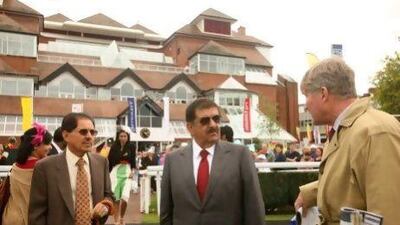The sudden downpours may have said English summer, but the billowing banners and the overflowing Arabian hospitality stamped the day as pure Dubai.
The Dubai Summer festival, which is held annually over three days in July at Newbury Racecourse in the county of Berkshire, west of London, culminated on Sunday with the largest Arabian racing day to be held in Europe.
The event has three aims: to promote the UAE to British society, to encourage business for the Shadwell Stud, the Thetford, Norfolk, breeding house of Arabian horses, and to introduce a new audience to Arabian racing, a sport that is so entwined in the history and heritage of the Middle East.
The idea of turning a piece of Berkshire turf once a year into a UAE flagship for Arab racing was the brainchild of Sheikh Hamdan bin Rashid Al Maktoum, Deputy Ruler of Dubai, who arrived by helicopter at Newbury Racecourse on Sunday morning in a rainstorm worthy of an Indian monsoon. As the crowds dived for cover, several of the 54 scholarship students from eight universities - seven in the UAE and one from Qatar - rushed out of their tent to feel the rare sensation of being rained upon.
In the UK for a month to study multiculturalism, globalisation and the links between Islam and Christianity at the Al Maktoum College of Higher Education in Dundee, Scotland, Aisha Al Nuami said getting wet was all part of the cultural experience.
"It's really fabulous here," said the UAE University linguistics student. "It is the first time I have ever been to the races... and we love the rain."
For the uninitiated, the difference between Arabian and thoroughbred horses can be confusing. While they do not race against each other, they share the same genes.
In practical terms, it comes down to size and speed. The Arabian horse is recognised as the purest and oldest of all horse breeds, known for its stamina and ability to carry its rider across miles of open desert. Over short distances though, the thoroughbred - all of which are descended from three Arabian horses taken to England in the 1700s - will outpace it with tactical speed.
Trying to get the wider racing community in Europe and America to give purebred Arabian racing comparable status has not been easy, although this particular meeting, with a serious £500,000 (Dh3m) prize money, is helping to pave the way.
But if the day is supposed to be educational, the message is delivered lightly. With no entrance fee and hundreds of prizes and free gifts, the event proved a big draw for Berkshire residents. Some, like Janet Bentley, a nursing assistant, are warmly rewarded, She was one of the five people to win holidays to Dubai, courtesy of Emirates Airline and the Rotana hotel group.
"I normally go caravanning," she said. "It's very generous of Sheikh Hamdan to do all this."
Berkshire children also have reason to be grateful to the sheikh. Four life-size glass fibre camels and five horses were sent from Dubai to nine local schools to be decorated competitively, with cash prizes going to the winners.
Sheikh Hamdan's passion for Arab racing is shared by the Abu Dhabi and Omani royal families, all of whom had a presence at the racecourse on Sunday.
"These three families, the Maktoums, the Nahyans and the Thanis are driving the recognition of Arabian horse-racing," says Richard Lancaster, the director of Shadwell stud. "This day is the only one in the calendar given over entirely to Arab racing and it exists because of their passion for it. It is part of the history and heritage of their country and they want to see it flourish."
The challenge that remains was summed up by Howard Wright, a racing columnist who writes for New Zealand's popular Sporting Post, a paper that has yet to put its weight behind Arabian racing.
"The quality of the racing is superb, on par with most of the best Arabian horses from around the world," he says. "But most of the people here are not aware of the quality that they are seeing. It's a great day out for the people in the community and it really works in that sense, but the Arabian Racing Organisation needs to build on it. There is a small core of people who are here because they understand it, but most are here just to have fun."
One person having fun and ready to spread the message was Eliza Cook, a blogger for the British HorseRacing Authority. She had dressed up with her friend Coni Mascique to find out what it was all about, and to collect material for lovetheraces.com.
"I have never seen Arab horse racing before and I am loving it," said Cook. "As well as being smaller, their eyes seem wide-set. But what I like most is their distinctive tails, which they hold up like flags."

